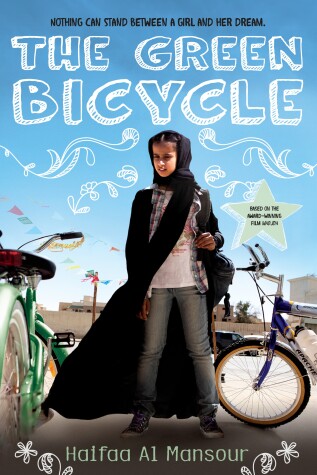Reviewed by nannah on
Book: “Based on the award-winning film!”
Me: … Oh.
The book is actually written by Haifaa Al Mansour, the film director and screenwriter who also created … you guessed it, Wadjda. This is also her first novel. It’s also surprisingly well written for a book based on a movie, and also a debut by someone focusing on film (most movies-to-books have been … pretty lackluster in my experience).
Content warnings:
homophobia/lesbophobia
lots of in-book misogyny
Eleven-year-old Wadjda lives in Saudi Arabia with her mother … and … nope, just mother (dad? What dad?). While her mother seems to struggle to get by on her teaching job a long, long drive away through the desert, her father has a ton of money that neither of them really see (it’s all spent on himself: gaming consoles, a TV, and, unfortunately, a dowry for another bride that threatens to tear the family apart). Meanwhile, at school, Wadjda sells forbidden mixtapes and jewelry for extra cash so she can buy the most Amazing green bicycle. Even though girls riding bikes is forbidden. Along with most other things. But Wadjda is determined to buy this bike and beat her best friend, Abdullah, in a race. The only problem(s)? The bike is 800 Riyals, her mom has forbidden her to buy said bike, and she’s just been caught selling mixtapes.
While this IS one of the best movies-to-books I’ve ever read, it failed to keep my attention all the way through. It’s a pretty big book for so simple a plot, ultimately: Wadjda dreams of getting her green bicycle. The PoV also alternates at completely random times → mostly just to Wadjda’s best friend, Abdullah. It still threw me off. Alternating PoVs as a concept should be introduced early on so readers can be well acquainted to it -- not midway. Done that way it’s one of the things most likely to throw a reader out of the story/world.
I would also like to mention that this book has a very Western bias, and I’m not sure what I can say about that except that the author does present the story and her culture through that Western lens. No opinion on this (not that I really can have one here), just a statement.
Now, what I really didn’t like:
There’s a really lesbophobic element (and yes, I know it could/might happen in Saudi Arabia every day. However, I didn’t like the way Haifaa Al Mansour particularly handled it in this book. And possibly the movie as well. Spoilers for clarity: Two girls in school who Wadjda look up to get caught being “too close” to one another by a door. While they were really going to paint their toes, it looked like maybe ?? they were somehow touching each other under their abayahs. So the teacher said they were, in fact, inappropriately touching each other and called in Wadjda as a witness. For some reason, Wadjda says she couldn’t clearly see what was going on, which condemns the two girls to public humiliation, and worse: being outcasted by everyone else at school (with “EW DON’T TOUCH ME” being a part of their daily lives now).
For anyone who didn’t read the spoiler: basically Wadjda told a lie that led to two fellow classmates being publicly humiliated and now treated awfully by everyone else at school (due to lesbophobia). Wadjda never apologized, and the narrative acts like “going back to her troublemaking self” makes up for it, since those girls called her a traitor for “being the school’s favorite convert” and playing nice.
As a lesbian reading this, though … it … doesn’t? Not for me, at least. In fact, Wadjda gets away with So Much without ever apologizing or talking things through. And buying something or pouting -- or even a simple look will get her back in good standing. Everyone else around her, including her poor mom, does everything for her and gets nearly nothing back. I even felt sorry for Abdullah a couple times, and I never thought I would with his sexist ways!
Anyway, I’ll still watch the movie, but I think the lesbophobia will still throw me off. Though the mother and daughter moments holding strong in the face of Wadjda’s father are the highlights, they don’t make up for the rest of the book, which just paled in comparison.
Reading updates
- Started reading
- 27 September, 2019: Finished reading
- 27 September, 2019: Reviewed
